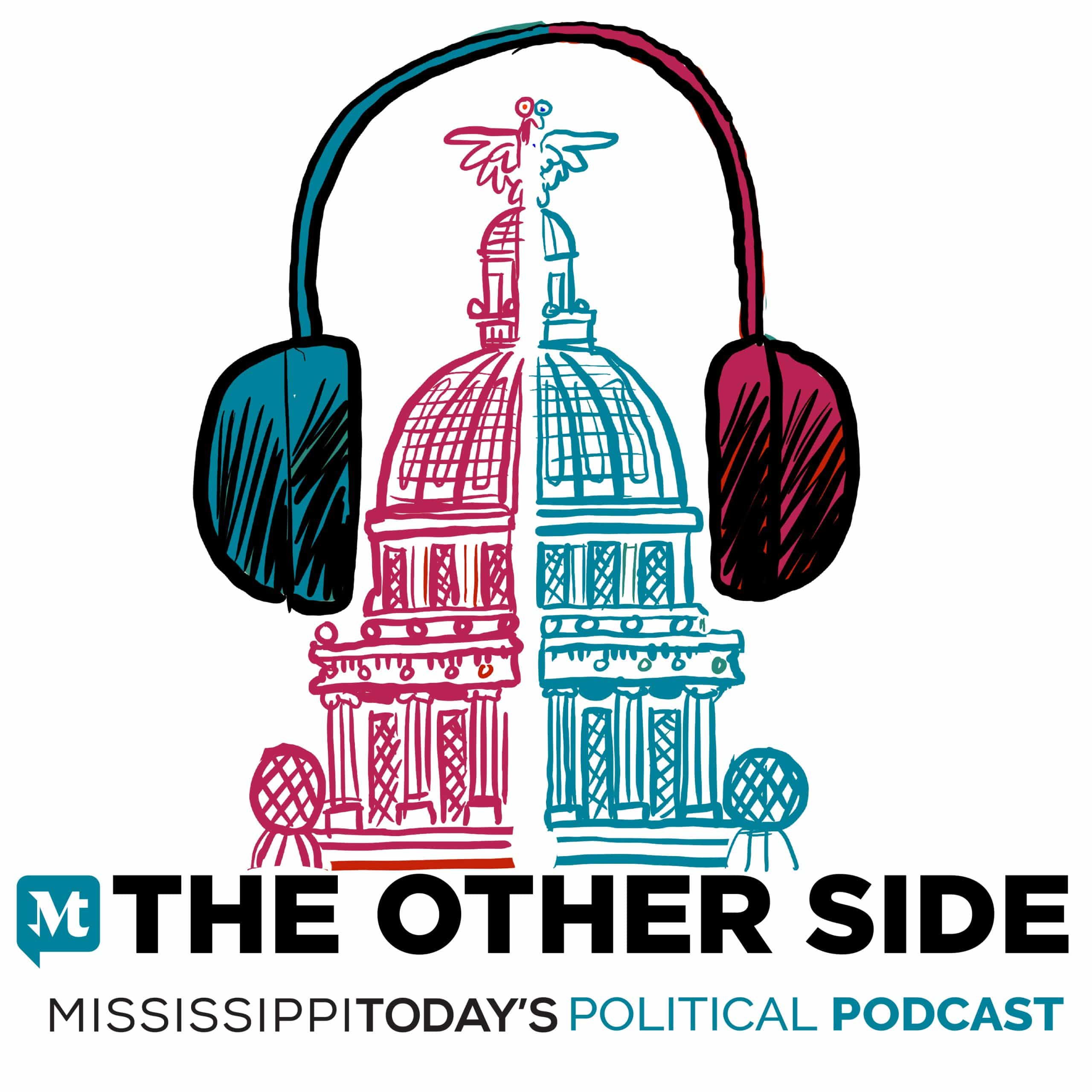Mississippi Today
Democrat Presley urges Gov. Reeves to call special session on cutting grocery tax

Democratic gubernatorial candidate Brandon Presley on Thursday said Republican Gov. Tate Reeves should call lawmakers back to the state Capitol for a special legislative session to abolish Mississippi's sales tax on groceries, the highest such tax in the nation.
Presley, north Mississippi's utility commissioner, believes the 7% tax on food should be eliminated because it's a harsh policy that forces people on all ends of the economic spectrum to pay extra for a basic necessity like food.
“At a time in which Mississippians are struggling, we know that this cost is hurting folks, and particularly working families who are out there trying to make ends meet and meet that family budget,” Presley said.
Both of Mississippi's leading candidates for governor want to reduce state taxes. Reeves continues to advocate for abolishing the state income tax, and Presley wants to eliminate the state's tax on food and cut fees on car tags in half.
Lawmakers are typically in the capital city for their regular session from early January to April. After lawmakers adjourn their session, they cannot reconvene at any point during the year to pass new laws unless the governor calls them back to Jackson for a special session.
The state Constitution grants the governor power to set the terms of a special session. Reeves did not respond to a request for comment about Presley's Thursday comments. Reeves in his first term has only called one special legislative session, to approve $247 million in state incentives for an aluminum mill.
Lawmakers last year significantly reduced the individual income tax, and once it's fully implemented, Mississippi will have a flat 4% tax on all earned income over $10,000. But Reeves believes that tax should be gone entirely.
“I pushed to eliminate our state income tax, and we've achieved the largest tax cut in state history,” Reeves said in Gulfport earlier this month. “And we can do more because this is Mississippi's time.”
The Republican candidate's campaign, however, has said Reeves would be open to any type of tax cut the Legislature passes, including reducing the grocery tax.
But Presley said that the governor's willingness wasn't enough and excoriated him for not openly advocating on abolishing the tax.
“Where have you been for 12 years?” Presley asked. “Have you been that busy at fundraisers that you didn't know that people wanted their grocery tax eliminated?”
The different tax cut policies come at a time when Alabama Gov. Kay Ivey signed a bill into law in the state that lowers its grocery tax from 4% to 3%. The legislation calls for the tax to decrease even further if specific growth metrics are met to offset the tax reduction, according to the Associated Press.
Both tax cut plans from Reeves and Presley would reduce the amount of revenue the state collects each year.
The state's income tax accounts for over $2.4 billion in the general fund, roughly one-third of its total general budget.
Reeves has said in previous remarks that if the income tax were abolished, the increase in economic investment and consumer spending would make up for the decrease in income tax collections.
It's unclear how much money Mississippi collects from the grocery tax because the Mississippi Department of Revenue, the state's tax collection agency, doesn't precisely track that data.
A spokesperson for the department previously told Mississippi Today there were over $6 billion in grocery sales during the past fiscal year, which they estimated to have generated around $424.8 million in taxes. Of that amount, over $305 million is believed to have gone to the state's general fund.
Presley did not substantively answer questions about how state government would make up the difference if the grocery tax were eliminated but believed state leaders could find necessary funds to plug the shortfall if they determined that tax cut was a legislative priority.
This article first appeared on Mississippi Today and is republished here under a Creative Commons license.
Mississippi Today
Podcast: The controversial day that Robert Kennedy came to the University of Mississippi

Retired U.S. Bankruptcy Judge Edward Ellington talks with Mississippi Today's Bobby Harrison and Geoff Pender about former U.S. Attorney General Robert Kennedy's speech at the University of Mississippi less than four years after the riots that occurred after the integration of the school. Ellington, who at the time headed the Ole Miss Speaker's Bureau as a law school student, recalls the controversy leading up to the speech.
This article first appeared on Mississippi Today and is republished here under a Creative Commons license.
Did you miss our previous article…
https://www.biloxinewsevents.com/?p=359978
Mississippi Today
On this day in 1961
MAY 20, 1961

A white mob of more than 300, including Klansmen, attacked Freedom Riders at the Greyhound Bus Station in Montgomery, Alabama. Future Congressman John Lewis was among them.
“An angry mob came out of nowhere, hundreds of people, with bricks and balls, chains,” Lewis recalled.
After beating on the riders, the mob turned on reporters and then Justice Department official John Seigenthaler, who was beaten unconscious and left in the street after helping two riders.
“Then they turned on my colleagues and started beating us and beat us so severely, we were left bloodied and unconscious in the streets of Montgomery,” Lewis recalled.
As the mob headed his way, Freedom Rider James Zwerg said he asked for God to be with him, and “I felt absolutely surrounded by love. I knew that whether I lived or died, I was going to be OK.”
The mob beat him so badly that his suit was soaked in blood.
“There was nothing particularly heroic in what I did,” he said. “If you want to talk about heroism, consider the Black man who probably saved my life. This man in coveralls, just off of work, happened to walk by as my beating was going on and said ‘Stop beating that kid. If you want to beat someone, beat me.' And they did. He was still unconscious when I left the hospital.”
To quell the violence, Attorney General Robert Kennedy sent in 450 federal marshals.
This article first appeared on Mississippi Today and is republished here under a Creative Commons license.
Mississippi Today
2024 Mississippi legislative session not good for private school voucher supporters
Despite a recent Mississippi Supreme Court ruling allowing $10 million in public money to be spent on private schools, 2024 has not been a good year for those supporting school vouchers.
School-choice supporters were hopeful during the 2024 legislative session, with new House Speaker Jason White at times indicating support for vouchers.
But the Legislature, which recently completed its session, did not pass any new voucher bills. In fact, it placed tighter restrictions on some of the limited laws the state has in place allowing public money to be spent on private schools.
Notably, the Legislature passed a bill that provides significantly more oversight of a program that provides a limited number of scholarships or vouchers for special-needs children to attend private schools.
Going forward, thanks to the new law, to receive the vouchers a parent must certify that their child will be attending a private school that offers the special needs educational services that will help the child. And the school must report information on the academic progress of the child receiving the funds.
Also, efforts to expand another state program that provides tax credits for the benefit of private schools was defeated. Legislation that would have expanded the tax credits offered by the Children's Promise Act from $8 million a year to $24 million to benefit private schools was defeated. Private schools are supposed to educate low income students and students with special needs to receive the benefit of the tax credits. The legislation expanding the Children's Promise Act was defeated after it was reported that no state agency knew how many students who fit into the categories of poverty and other specific needs were being educated in the schools receiving funds through the tax credits.
Interestingly, the Legislature did not expand the Children's Promise Act but also did not place more oversight on the private schools receiving the tax credit funds.
The bright spot for those supporting vouchers was the early May state Supreme Court ruling. But, in reality, the Supreme Court ruling was not as good for supporters of vouchers as it might appear on the surface.
The Supreme Court did not say in the ruling whether school vouchers are constitutional. Instead, the state's highest court ruled that the group that brought the lawsuit – Parents for Public Schools – did not have standing to pursue the legal action.
The Supreme Court justices did not give any indication that they were ready to say they were going to ignore the Mississippi Constitution's plain language that prohibits public funds from being provided “to any school that at the time of receiving such appropriation is not conducted as a free school.”
In addition to finding Parents for Public Schools did not have standing to bring the lawsuit, the court said another key reason for its ruling was the fact that the funds the private schools were receiving were federal, not state funds. The public funds at the center of the lawsuit were federal COVID-19 relief dollars.
Right or wrong, The court appeared to make a distinction between federal money and state general funds. And in reality, the circumstances are unique in that seldom does the state receive federal money with so few strings attached that it can be awarded to private schools.
The majority opinion written by Northern District Supreme Justice Robert Chamberlin and joined by six justices states, “These specific federal funds were never earmarked by either the federal government or the state for educational purposes, have not been commingled with state education funds, are not for educational purposes and therefore cannot be said to have harmed PPS (Parents for Public Schools) by taking finite government educational funding away from public schools.”
And Southern District Supreme Court Justice Dawn Beam, who joined the majority opinion, wrote separately “ to reiterate that we are not ruling on state funds but American Rescue Plan Act (ARPA) funds … The ARPA funds were given to the state to be used in four possible ways, three of which were directly related to the COVID -19 health emergency and one of which was to make necessary investments in water, sewer or broadband infrastructure.”
Granted, many public school advocates lamented the decision, pointing out that federal funds are indeed public or taxpayer money and those federal funds could have been used to help struggling public schools.
Two justices – James Kitchens and Leslie King, both of the Central District, agreed with that argument.
But, importantly, a decidedly conservative-leaning Mississippi Supreme Court stopped far short – at least for the time being – of circumventing state constitutional language that plainly states that public funds are not to go to private schools.
And a decidedly conservative Mississippi Legislature chose not to expand voucher programs during the 2024 session.
This article first appeared on Mississippi Today and is republished here under a Creative Commons license.
-
Our Mississippi Home6 days ago
Beat the Heat with Mississippi’s Best Waterparks
-
SuperTalk FM3 days ago
State auditor cracking down on Mississippians receiving unemployment benefits
-
Our Mississippi Home7 days ago
Charlie’s U-Pik: Opening Soon for the Summer Season
-
Mississippi News Video5 days ago
Jackson has a gang problem
-
Kaiser Health News6 days ago
Medicaid ‘Unwinding’ Decried as Biased Against Disabled People
-
Local News3 days ago
Family files lawsuit after teen’s suicide in Harrison County Jail
-
Mississippi Today4 days ago
On this day in 1950
-
228Sports6 days ago
George County Pours Runs In 6A South State Title Victory At PRC









































